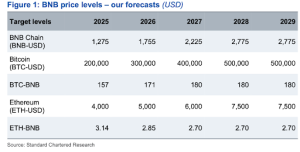
- Standard Chartered predicts BNB could reach $2,775 by 2028, a potential increase of over 360%.
- The forecast highlights BNB’s role as a benchmark for digital asset prices and the impact of DeFi on its growth.
Binance’s BNB token is projected to increase significantly in value over the coming years, driven by factors such as decentralized finance (DeFi) activity and institutional interest. Standard Chartered’s Geoffrey Kendrick suggests that BNB could serve as a key indicator for the broader digital asset market.

Key Factors Influencing BNB’s Potential Growth
Standard Chartered has initiated coverage on Binance’s BNB token, forecasting a climb to $2,775 by the end of 2028, a gain of over 360% from current levels. Geoffrey Kendrick, Standard Chartered’s global head of digital assets research, stated that BNB has closely tracked an equal basket of Bitcoin and Ethereum since May 2021 in terms of both returns and volatility.

Kendrick views BNB as a benchmark-like asset within the cryptocurrency market. While it may underperform Bitcoin and Ether in terms of real returns and market capitalisation, BNB’s deflationary nature and its connection to Binance’s centralised exchange support its long-term value.
BNB Chain, Binance’s Layer 1 blockchain, operates using a proof-of-staked authority consensus model, where 45 validators are elected every 24 hours based on staked token amounts. While this structure is more centralised than networks like Ethereum, which have over a million validators, it provides a degree of efficiency.
Since the beginning of 2024, BNB Chain’s Total Value Locked TVL has increased from approximately $3.5 billion to over $6 billion, according to data from DefiLlama. However, it has yet to recover to its all-time highs of over $20 billion in 2022. As of May 7, BNB Chain ranks fourth among layer-1 blockchain networks by TVL. An important signal of the growing maturity of BNB in the financial landscape comes from Wall Street.
The important fund manager VanEck has recently filed a registration statement with the SEC for the launch of the first U.S. ETF dedicated to BNB. This exchange-traded fund, known as VanEck BNB ETF, will be designed to directly track the spot price of BNB and may include staking features, allowing investors to earn rewards in BNB in addition to exposure to price gains.
Additionally, according to Standard Chartered, BNB Chain’s “use cases remain almost entirely on decentralised exchanges DEXs, lending protocols, and liquid staking,” making it a more concentrated smart contract platform than its rivals. PancakeSwap is among BNB Chain’s largest DEXs, with roughly $1.5 billion in TVL, according to DefiLlama.
The BNB token benefits from strong user demand, supported by its integration with Binance’s centralised exchange, where token holders receive trading fee discounts based on their BNB balance and volume. This exchange-linked utility, along with the dominance of decentralised exchanges like PancakeSwap within BNB Chain, has helped the BNB Chain retain activity even as competition from other ecosystems like Solana grows.
BNB also benefits from a deflationary supply model and token burn mechanisms. The token currently trades “rich” on Standard Chartered’s preferred valuation metric for smart contract Layer 1 platforms, market cap-to-GDP, likely due to both its exchange tie-ins and its deflationary nature.
Kendrick has also made predictions for other cryptocurrencies, expecting Bitcoin to reach $200,000 by the end of 2025 and $500,000 by the end of 2028. He also projects Avalanche’s AVAX token to climb to $250 by 2029 and XRP to hit $12.50 by 2028. Today, BNB is trading at $614.85, up 1.74% in the last 24 hours.

The post DeFi and Institutional Demand Push BNB Chain Higher – $2,775 in Sight appeared first on ETHNews.


